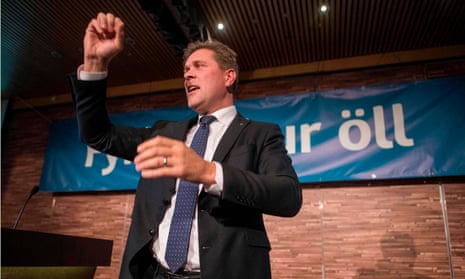Iceland has appointed Bjarni Benediktsson to replace Katrín Jakobsdóttir as prime minister after she resigned to run in the country’s upcoming presidential election.
Benediktsson, who was previously the Nordic country’s foreign minister, officially took over from Jakobsdóttir on Tuesday night after she stood down following more than six years in office.
The announcement came after an agreement was reached between his party, the Independence party, which is conservative and pro-business and trade, and the other governing parties: the Progressive party and Jakobsdóttir’s Left-Greens.
The Independence party said in a statement that, after “very good discussions in recent days”, the governing parties had “reached a conclusion”. Benediktsson, it said, wanted the government “to stand for political stability”.
He plans to focus on issues including disability, energy procurement and immigration, as well as tackling inflation, the statement said.
“This is a very happy moment,” said Jakobsdóttir outside Bessastaðir, the official presidential residence near Reykjavík, on Tuesday night.
She added: “I am happy that these parties have managed to agree on a functioning government.”
Benediktsson previously served as finance minister under Jakobsdottír and was prime minister for 10 months in 2017.
Unless the government decides to call a snap election before then, Iceland’s next parliamentary elections are due to be held next year.
In Iceland, the prime minister is head of government and usually has a seat in parliament. They are formally appointed by the president and exercise executive authority with the cabinet with the support of parliament. The president, meanwhile, is a ceremonial figurehead and head of state, voted for by the public, with limited political power.
The change in leadership comes at a pivotal time for Iceland, which is in the midst of volcanic eruptions near Grindavík that have led to the evacuation of thousands of people, the death of one man who was working to secure the site, and regional disruption to power supply.
After announcing her candidacy last week to replace the outgoing president Guðni Th. Jóhannesson – who, despite high approval ratings, announced on New Year’s Day that he was stepping down after two terms – Jakobsdóttir is now a frontrunner to replace the historian and former university professor.
Other leading presidential candidates include politics professor Baldur Þórhallsson, comedian and Reykjavík’s former mayor Jón Gnarr, and businessperson Halla Tómasdóttir.
after newsletter promotion
During her time as prime minister, Jakobsdóttir has been a prominent voice on the global stage for gender equality.
As well as serving as chair of the Council of Women World Leaders, Iceland’s premier made headlines last year when she talked about her loneliness amid the dwindling number of female world leaders. Taking part in her country’s record-breaking women’s strike in October, she told the Guardian that her dream was to achieve full gender equality in Iceland before 2030.
In 2022, she also published her debut crime novel, Reykjavík: A Crime Story, which she co-wrote with bestselling Icelandic author Ragnar Jónasson.
In a video released last week, she said the world faced “enormous challenges in climate and environmental issues. The pace of technological development is unprecedented, and it has never been more important to foster and protect humanity”.
She added: “The experience I have in politics, the experience of bringing together different groups, and the understanding I have gained during this time, make me well-suited for this [presidential] office.”
